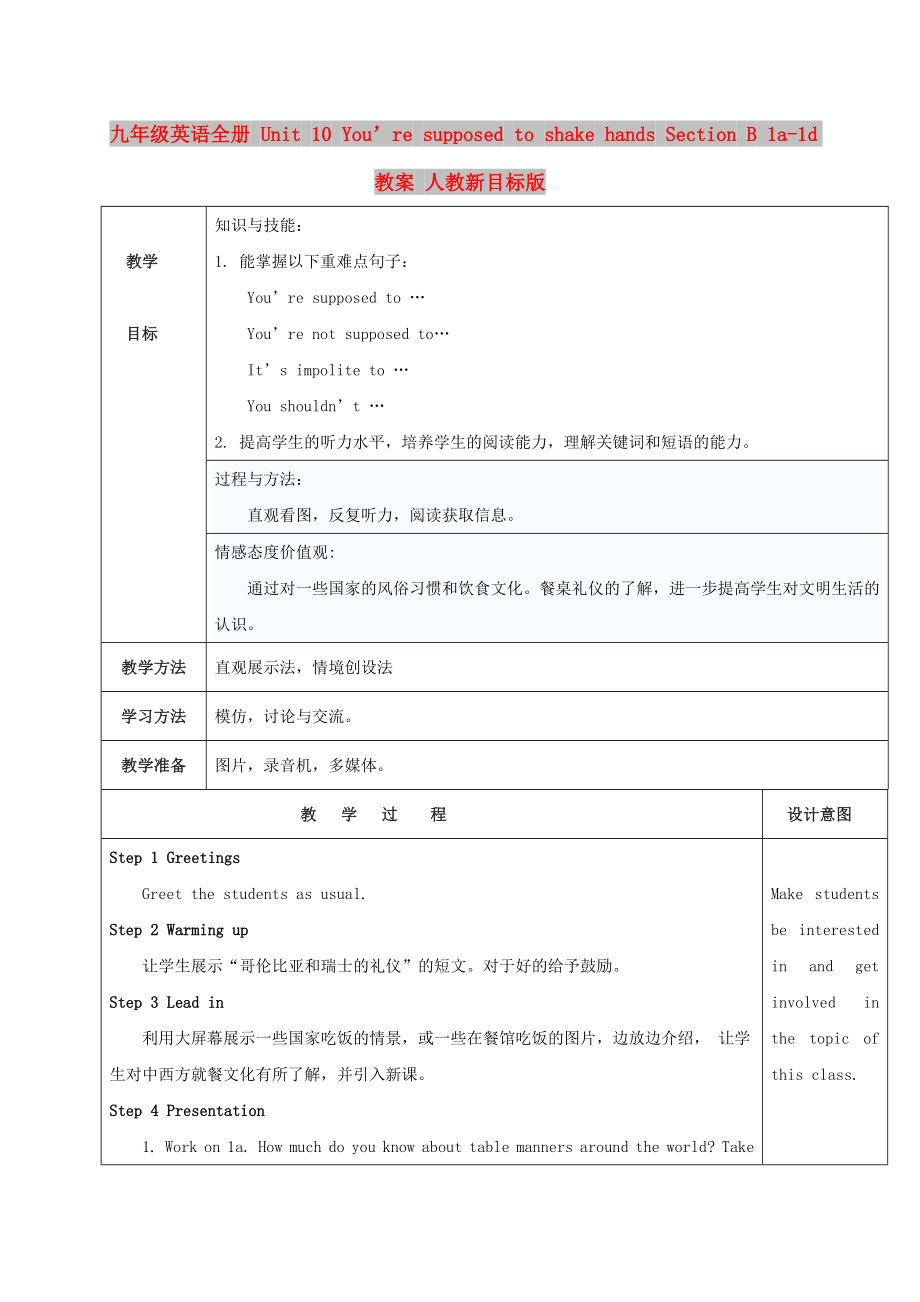《九年級英語全冊 Unit 10 You’re supposed to shake hands Section B 1a-1d教案 人教新目標版》由會員分享���,可在線閱讀�,更多相關(guān)《九年級英語全冊 Unit 10 You’re supposed to shake hands Section B 1a-1d教案 人教新目標版(3頁珍藏版)》請在裝配圖網(wǎng)上搜索�。
1、九年級英語全冊 Unit 10 You’re supposed to shake hands Section B 1a-1d教案 人教新目標版
教學(xué)
目標
知識與技能:
1. 能掌握以下重難點句子:
You’re supposed to …
You’re not supposed to…
It’s impolite to …
You shouldn’t …
2. 提高學(xué)生的聽力水平����,培養(yǎng)學(xué)生的閱讀能力����,理解關(guān)鍵詞和短語的能力��。
過程與方法:
直觀看圖�,反復(fù)聽力,閱讀獲取信息�。
情感態(tài)度價值觀:
通過對一些國家的風俗習慣和飲食文化。餐桌禮儀的了
2�、解,進一步提高學(xué)生對文明生活的認識�。
教學(xué)方法
直觀展示法,情境創(chuàng)設(shè)法
學(xué)習方法
模仿��,討論與交流����。
教學(xué)準備
圖片,錄音機����,多媒體。
教 學(xué) 過 程
設(shè)計意圖
Step 1 Greetings
Greet the students as usual.
Step 2 Warming up
讓學(xué)生展示“哥倫比亞和瑞士的禮儀”的短文��。對于好的給予鼓勵��。
Step 3 Lead in
利用大屏幕展示一些國家吃飯的情景,或一些在餐館吃飯的圖片����,邊放邊介紹���, 讓學(xué)生對中西方就餐文化有所了解���,并引入新課。
Step 4 Presentation
1. Wo
3��、rk on 1a. How much do you know about table manners around the world? Take the following quiz. Circle T for true or F for false after each sentence.
Mind your manners!
1. In India, you’re supposed to eat with your hands. T F
2. In China, you’re not supposed to stick your chopsti
4����、cks into the food. T F
3. In Korea, the youngest person is expected to start eating first. T F
4. In France, you’re supposed to put your bread on the table. T F
5. In China, it’s impolite to use your chopsticks to hit an empty bowl. T F
1)先讓學(xué)生自己做,老師指導(dǎo)�,讓他們理解每個句子的意
5、思����。
2)共同討論,核對答案�。
2. Listening. Work on 1b. Steve is going to China to study. His friend Yang Ming is telling him about the table manners in China. Listen and number the pictures in the order you hear them.
Work on 1c. Listen again. Match the sentence parts.
讓學(xué)生看1b插圖。說一說他們在干什么����?然后讓學(xué)生聽第一次錄音���,把插圖的順序?qū)?/p>
6、出來����。再讓學(xué)生第二次聽錄音,把1c兩部分句子連起來�。
Step 5 Practice
1. 讓學(xué)生齊讀1c 句子。
2. 讓學(xué)生兩人一組操練1d.
Talk about other manners in your country.
A: We are supposed to…
B: Yes, It’s impolite to…
Step 6 Consolidation
根據(jù)聽力和同學(xué)的討論���,說說我們的餐桌禮儀����,學(xué)生四人一組開展活動���,共同討論�, 把每個觀點都記錄下來��。從而達到反復(fù)操練目標語言的目的�。
1. You’re not supposed to start eat
7、ing first if there are older people at the table.
2. You shouldn’t point at anyone with your chopsticks.
3. It’s impolite to stick your chopsticks into your food.
4. It’s impolite to use your chopsticks to hit an empty bowl.
5. You are not supposed to talk when you’re eating dinner.
6. It’s no
8、t necessary to order too many dishes.
7. It’s impolite to make a big noise when you are eating soup.
8. You’re not supposed to put your clothes into a bowl or plate when picking up your food with chopsticks.
Step 7 Group work.
Work on 2a. What do you know about customs in foreign countries? W
9�、hat do you think is the biggest challenge when visiting a foreign country?
e.g. My cousin went to America, and she said that learning basic table manners was her biggest challenge. She never knew what she was supposed to do at the dinner table.
提前預(yù)習或查閱資料,了解外國的一些餐桌禮儀����,你認為到外國參觀時最大的挑戰(zhàn)是什么?
讓學(xué)生分享他們的答案��。
10�、
Step 8 Homework
Practice the conversation in pairs.
Make students be interested in and get involved in the topic of this class.
By listening and speaking, students can improve their listening and speaking skills.
板書
設(shè)計
Unit 10: You’re supposed to shake hands.
Talk about other manners in your country.
A: We are supposed to…
B: Yes, It’s impolite to…
教
后
反
思
 九年級英語全冊 Unit 10 You’re supposed to shake hands Section B 1a-1d教案 人教新目標版
九年級英語全冊 Unit 10 You’re supposed to shake hands Section B 1a-1d教案 人教新目標版

